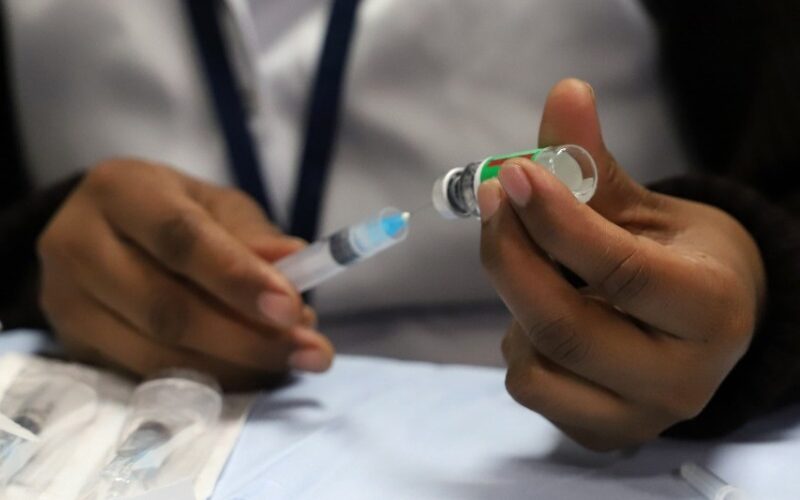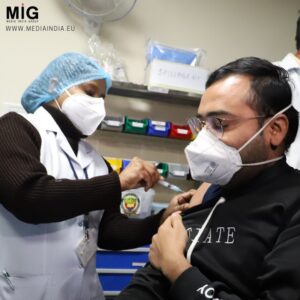Time to pause Covaxin administration

The government says over the first three days of vaccinations, 580 people had reported adverse symptoms of the 381,305 vaccinations done (MIG photos/Aman Kanojiya)
Amidst growing scepticism over the safety of vaccines, especially Covaxin developed by Bharat Biotech, in collaboration with Indian Council of Medical Research and National Institute of Virology, three days after the nationwide vaccination programme against Covid-19 was rolled out, the Karnataka Association of Resident Doctors has asked the state government to allow healthcare workers to choose the vaccine administered to them. The doctors, in a letter to state health minister K Sudhakar, say that resident doctors in several districts in the state feel they are being discriminated against.
At present, Covaxin is being administered only in some district hospitals, while in others it is Covishield, the vaccine developed by Oxford University and AstraZeneca which is manufactured in India and sold by Serum Institute of India under the brand name Covishield. The doctors object to the fact that they have to sign a document stating that the clinical efficacy of Covaxin is yet to be established.
There have been several reports of medical professionals abstaining from vaccines in the first phase, which has been reserved for the healthcare workers in the country as nearly one-third of those supposed to have received the vaccination, free of cost, failed to turn up. The reticence has mounted as three persons have so far died after receiving the vaccine, though the government denies any connection. One of the deaths was of a 52-year-old healthcare worker in Uttar Pradesh who died on Saturday. The government has blamed the death on cardiopulmonary disease, ruling out any connection with the vaccine. In another incident, a 43-year-old man died in Karnataka and his autopsy results are awaited. The government says over the first three days of vaccinations, 580 people had reported adverse symptoms of the 381,305 vaccinations done.
Though the government has tried to dismiss concerns over safety of the vaccine as being unfounded or pure malafide, the confidence levels amongst the healthcare professionals remains extremely low and it shows in the high level of abstention in various parts of the country. For instance, in the capital New Delhi, only 53 pc of the people expected to be vaccinated turned up, the figure in the southern state of Tamil Nadu is barely 16 pc and in Rohtak district in Haryana, it stood at 29 pc. Doctors have been cited by media as saying the people are scared and unwilling to get vaccinated.
Fools rush in where angels fear to tread
The fear over Covaxin is likely to rise further as the programme progresses and more adverse reactions are reported. The response is indeed natural as Covaxin is the only Covid-19 vaccine which has been allowed to be used in the world without having completed phase 3 or clinical trials on a large scale.
In a normal drug development scenario, there are four phases of trials, with an increasing number of people who volunteer for each stage of the trial. It is key responsibility of the pharmaceutical firm to ensure that each volunteer is fully aware of the risks involved. The last phase of trials are carried out across several countries in different geographies to get as diverse a set of people as possible.

Only in India has a vaccine been granted emergency use authorisation, even though it has not completed its phase 3 trials
In the case of Covid-19 pandemic, in view of the urgency that the vaccines were needed, most drug regulators and governments allowed the companies to expedite the entire process, including trials. However, every single vaccine that has been approved, be it by Pfizer, Moderna or AstraZeneca, all of them have had extensive phase 3 trials and their details have not only been submitted to the drug regulators for their opinion, but the details have also published for the public in an attempt to boost confidence in the drugs. For instance, phase 3 trials of Oxford-AstraZeneca vaccine involved over 100,000 persons in different countries. Similarly, Pfizer, Moderna, as well as the Chinese vaccine, Sinovac, which conducted its phase 3 trials in Turkey, Brazil, Indonesia, besides China.
However, in India, and according to the currently available reports, only in India has a vaccine been granted emergency use authorisation (EUA) even though the vaccine has not completed its phase 3 trials. This is not just medically unethical, but a complete disregard to human safety and values of human lives.
Vote of no confidence
In Covaxin’s case, days before the nationwide campaign was to begin, reports said that the drug regulator had rejected the request for EUA citing lack of phase 3 trials data. However, as has become the norm with this government, within hours, the regulator changed its stance and granted the approval. The about-turn raised serious doubts amongst the scientific and healthcare communities about the rollout. The government’s statements on the issue, far from assuaging fears of the country, have only led to many more questions being raised on exactly what is happening.
The approval for Covaxin has been issued with statement that its use will be “restricted to public interest as an abundant precaution, in clinical trial mode, especially in the context of mutant strains”.
The government’s action has not gone unnoticed in the medical community. All India Drug Action Network, a watchdog, said it was baffled to understand the scientific logic to approve an incompletely studied vaccine. “Since there is no data for the third phase of trials, we don’t know how efficacious this vaccine is. We know it is safe, going by the limited phase two trials. What if we roll out a vaccine with unknown efficacy and later find it to be only 50 pc efficacious? Would it be fair to people who received it?” Dr Shahid Jameel, a virologist, was quoted by media.
Bharat Biotech claims its vaccine is 200 pc safe and says it has a stockpile of 20 million doses of Covaxin, with the aim to make 700 million doses in the next 12 months. Krishna Ella, chairman, says that the Indian clinical trial laws allowed accelerated authorisation for use of drugs after the second phase of trials for unmet medical needs of serious and life-threatening diseases in the country.
The finer lines of rules notwithstanding, public confidence in Covaxin has already crashed. While an increasing number of healthcare professionals are opting out of Covaxin, some NGOs say that they would never deploy an untested drug on unsuspecting people, even if the government pulled out all stops to vaccinate the people.
While the Indian population may have few options in face of an aggressive government using all its power to push the untested vaccine on people, the global community will certainly reject attempts by India to export untested medicines to be tried on their people. The rushed and hushed attempt for this rollout is a long-term risk for India’s pharmaceutical industry, which has already been battered by several quality-related controversies and a number of Indian drugs or their batches have been rejected by drug regulators, notably by the United States Food and Drug Administration.
This action could cause long-term and major damage to a major export segment. Also, as India is home to nearly two-thirds of the global vaccine production capacity, uncertainty about the safety protocols being followed by the country’s drug regulator would undermine confidence amongst the international community.
But the biggest risk is for the hundreds of millions of poor Indians who would be led to take the vaccine unwittingly. By adopting a mercantile and reckless attitude the government is playing with the lives of its citizens, instead of protecting them.










